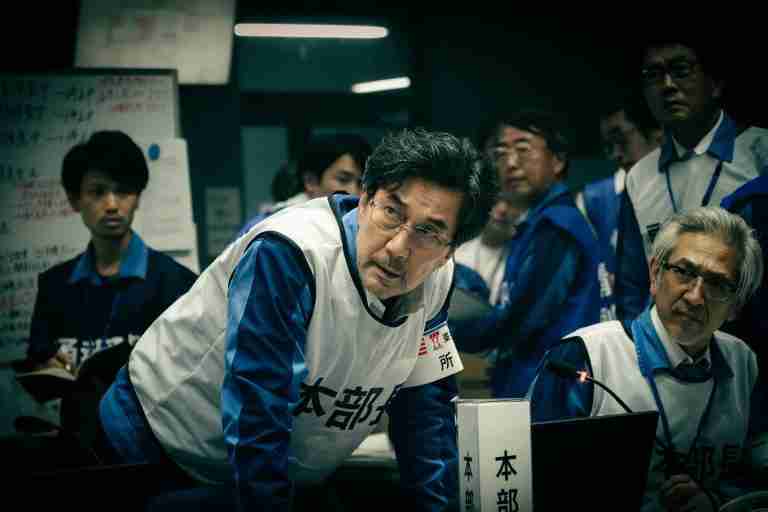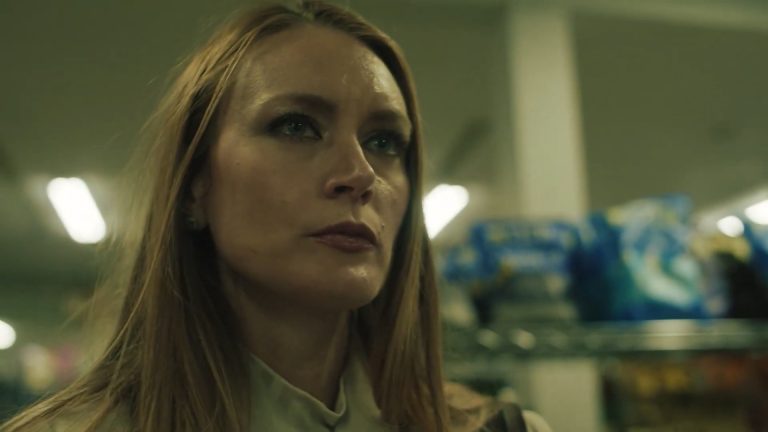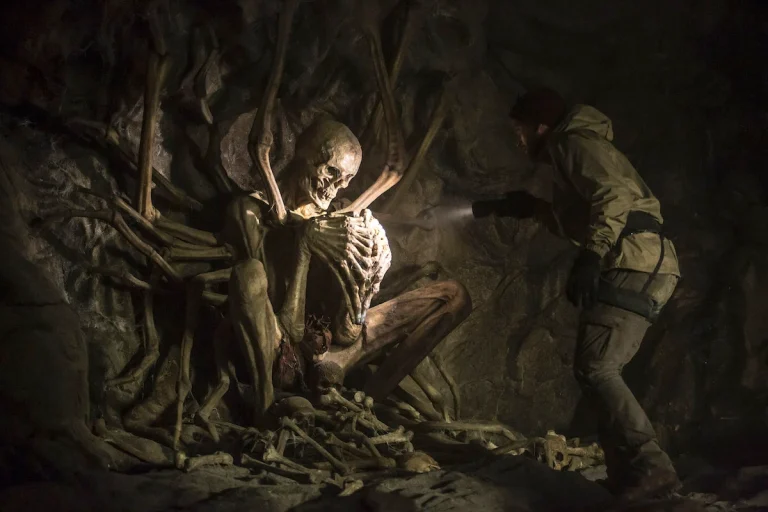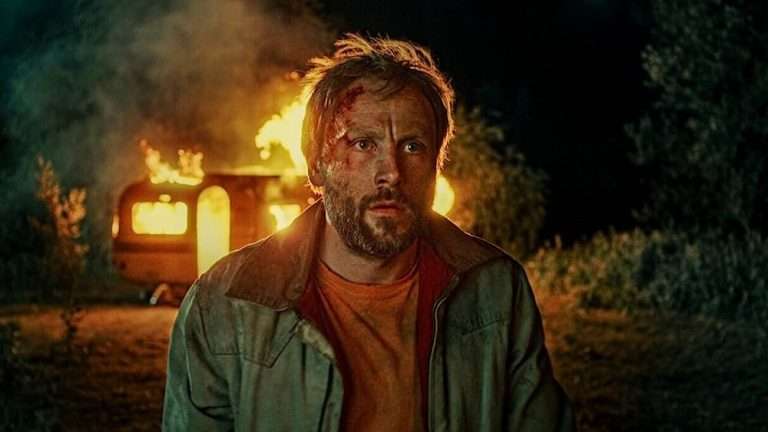In Jesse Armstrong’s “Mountainhead” (2025), four rich tech-bros get together at an isolated home on a mountaintop to discuss the future of their businesses as the world gets increasingly worse with every passing minute. At least one of them is directly responsible for the crises in Africa and the Global South, but they are instead busy talking about these countries like they were bets in a poker game. Everything is up for sale as they negotiate during this meeting, not for mutual benefit but to be on top of the pyramid by any means necessary.
Their hunger to reach their highest potential at the expense of collective benefit sounds eerily similar to the novel, which rhymes with the film’s title. The characters mention it within the first ten minutes or so. Then onwards, it just turns into a mindless battle of egos where they throw quotes and jargon in ways that will be comprehensible to them and alienate everyone else. It’s the kind of self-gratifying exercise that Armstrong earlier examined through the characters of “Succession.” Roughly two years after its conclusion, Armstrong returns with another zingy satire, which is angrier but insular, and that’s kind of the point. It fills you with an overwhelming sense of dread and isolation.
To put it in simple terms, Armstrong’s HBO film is about four grown boys dressed in men’s clothes playing gods and deciding the fate of the world in a way that benefits only them. Much like any tragic drama, things escalate once their egos clash to fulfill their self-serving fantasies. So, it’s another tragedy that not only hits too close to home but is jarringly close to the truth. It’s rather everyday news at this point.
Spoilers Ahead
Mountainhead (2025) Plot Summary & Movie Synopsis:
Written and directed by Jesse Armstrong, “Mountainhead” is a satirical comedy that plays out like a nightmarish horror scenario when four tech-bros discuss tragedies as opportunities for profit and propose a post-human reality without any remorse.
Who are the cast and characters in ‘Mountainhead’?
The film begins with Venis “Ven” Parish (Cory Michael Smith), a young billionaire, meeting his team right after the launch of a new feature on his social media app, Traam, which works on a divide-and-conquer philosophy, much like he does. At the time, Ven’s app starts pitting conflicted nations against each other to profit off of their pain and suffering. However, to avoid accountability for the rampant disinformation, he wants Bilter, a fact-checking generative AI company, owned by a fellow billionaire, Jeffrey “Jeff” Abredazi (Ramy Youssef). Unlike Ven, Jeff is optimistic about the AI’s potential to help resolve the crises.
Ven doesn’t care about that in the slightest. He just wants to acquire Jeff’s company, and he plans to do that at a house party of their millionaire friend Hugo Van Yalk (Jason Schwartzman), disparagingly called Souper. They will also be joined by Randall Garrett (Steve Carell), who’s like a mentor for the group. Hugo tells Jeff about Ven’s presence at the last minute, worried he might bail out otherwise, considering his recently publicized arguments with Ven. Jeff agrees to join regardless and is open to burying the hatchet. However, he is far from pleased to learn that his girlfriend/wife Hester (Hadley Robinson) is going to a sex party in Mexico while he is away. At times, it feels like Jeff is in a quid pro quo relationship with Hester, who likely helps him from being excluded while in the Western world.
What happens in ‘Mountainhead’?
Hugo’s party is supposed to be their time away from deals and businesses, but everyone has an ulterior motive behind attending it. Randall has terminal cancer, and he refuses to accept that he can’t be cured. He thinks he can find a post-human utopia with the potential of his younger peers. Hugo wants to join them in the billionaire club with his new plan for Slowzo, a meditation-oriented lifestyle app. Ven’s mission is to acquire Jeff’s fact-checking company, and Jeff doesn’t want to sell it. Instead, he plans to get Ven away from his company to work with the government, against Ven’s wishes, who would rather work for the government.

Jeff seeks help from Randall, who is on the Traam’s board. However, Randall is against Jeff’s plan since Jeff wants to bring content moderation to the platform, unlike Ven, who wants to use it to mitigate any accountability risks affecting his business. So, Randall speaks with Hugo and Ven to get Jeff out of the picture. What starts as a mere thought turns into a full-fledged mission to kill Jeff. Ven accepts Randall’s proposal almost immediately while Hugo comes around after realizing that this way, he won’t be the butt of their jokes anymore. After a failed attempt to kill Jeff, they arrive in his room to choke him with a pillow. However, no one is prepared enough to do the deed.
Mountainhead (2025) Movie Ending Explained:
Does Jeff sell Bilter to Ven?
Jeff briefly escapes Ven, Randall, and Hugo’s murder attempt and starts running for his life. Hugo locks all the exits to ensure Jeff can’t get out. Jeff hides in a sauna. Hugo finds him and locks him inside. Randall and Ven plan to burn Jeff to death. Hugo is not on board with this idea, not because he suddenly cares for Jeff, but because he won’t be able to use the sauna, thinking of what happened there. However, after convincing him, Ven and Randall pour gasoline around the sauna. Jeff works on a makeshift proposal to hand over Bilter to Ven and somehow convinces them to let him stay alive. The next morning, they allow Jeff to come out of the sauna. By then, he had already signed a makeshift deal to hand over Bilter’s control to Ven.
What do Jeff and Venis talk about in the end?
Still shaken by everything that happened the night before, Jeff walks to his car to meet Hester. Within moments, Ven walks out to discuss an alternate proposal to make a legitimate deal. Jeff doesn’t believe Traam will survive with or without Bilter’s help. Yet, he agrees to join forces with Ven only if Randall is not a part of it all. He also tells Ven that he will fight him in the end if need be. Even after everything Ven put him through, he considers this option because he sees a future for himself in it more than anything else. Otherwise, he is also desperate not to be left out of this billionaire group. So, this is his way to fit in and survive.
In those final moments, Ven returns to Jeff because he realizes Jeff’s potential to help his business as opposed to others. Randall will likely die soon, even if he likes to believe he won’t. Ven is of hardly any use. He was in on the plan of killing Jeff only because he is desperate not to feel like a failure, and thus, an ideal scapegoat in Ven and Randall’s eyes. For all these reasons, Ven and Jeff make a supposed U-turn on their strategies in the last few moments.
As they discuss the details, Randall sees them hugging as his car slowly drives away. He realizes that he is losing control over his life. As it happens, Hugo scrolls through the videos of atrocities on his phone. Right after, he opens his Slowzo app for his meditation session. It’s the kind of inhumane detachment we see in Jonathan Glazer’s “The Zone of Interest.”
Mountainhead (2025) Movie Themes Analyzed:
Disinformation and Masculinity
“Mountainhead” is essentially about these four men using any kind of information for their benefit and financial growth. They profit off of tragedies and mold data points in ways that serve them. Randall uses Hegel to justify using atrocities for personal gain while calling this a mere act of survival. Later, he uses Marcus Aurelius’s quote to justify his apathy, masquerading it as stoicism. They are intentionally out of touch with the ground reality since it feeds into their hyper-individualistic self-help philosophy.
Ven’s entire business model thrives on disinformation. He uses his untrustworthiness as an excuse to detach himself from any responsibility, pretending every tragic event is just a made-up scenario. So, Jeff’s fact-correcting venture feels like a threat to his survival. Under the fog of their myopic fantasies, they are all afraid that they may not make it out if they don’t try to obsessively control everything within their capacity. So, someone seemingly well-meaning like Jeff, who is naively optimistic about the use case of his AI platform, is ready to join hands with Ven after experiencing what it’s like to lose control over his life or his work. Even Hugo and Randall are victims of their fragile masculinity that refuses to let them ever feel fulfilled.







